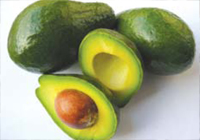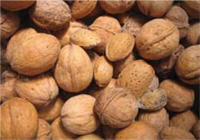Here are some suggested foods to protect your brain cells, improve memory, and even reduce your odds of developing Alzheimer’s disease.

Walnuts
These wrinkly nuts—which kind of resemble the human brain—are rich in vitamin E, an antioxidant associated with a lower risk of developing Alzheimer’s disease. Researchers at Chicago’s Rush University Medical Center studied the lifestyle habits of 6,000 people who were unaffected by the memory-robbing condition, and found that those who ate the most vitamin E-rich foods had a reduced Alzheimer’s risk. Vitamin E may trap free radicals that can damage brain cells, explains the Alzheimer’s Research Center.

Eggs
Those bright, round yolks are rich in choline, a B vitamin-like nutrient. When you eat eggs, your brain uses choline to make acetylcholine, a neurotransmitter that may be important for maintaining memory and communication among brain cells. Boston University researchers tracked the eating habits of nearly 1,400 healthy adults for 10 years and found that choline intake correlated positively with better performance on certain types of memory tests.

Blueberries
“Brainberries” is what Steven Pratt, MD, author of Superfoods Rx: Fourteen Foods Proven to Change Your Life, calls these antioxidant packed fruits on WebMD.com. In select animal studies, researchers found that blueberries helped protect the brain from oxidative stress, and may have worked to reduce the effects of age-related conditions such as Alzheimer’s disease or dementia, Pratt said. A Harvard study published last year in the journal Annals of Neurology found that women who reported eating more blueberries and strawberries were likely to have less-rapid cognitive decline than those who ate fewer of the fruits. (The research was partially funded by the California Strawberry Commission.)
Wine and Champagne
While too much alcohol can certainly destroy healthy brain tissue, drinking in moderation may be good for your mind. A study published earlier this year in the Journal of Biological Chemistry found that the antioxidant EGCG— found in red wine and green tea—helped stop beta-amyloid proteins from harming brain cells in the lab. Additionally, research from UCLA found that wine’s antioxidants may block proteins that build brain-destroying plaques. In other recent news, British researchers discovered that rats improved spatial memory when they consumed what would be the equivalent of a daily glass of Champagne; certain antioxidants in the bubbly may encourage growth of and better communication among nerve cells.

Avocados
Avocados are almost as good as blueberries in promoting brain health, Dr. Pratt told WebMD.com. These buttery fruits are rich in monounsaturated fat, which contributes to healthy blood #ow in the brain, according to Ann Kulze, MD, author of Dr. Ann’s 10-Step Diet: A Simple Plan for Permanent Weight Loss & Lifelong Vitality. They may also help lower blood pressure, which can reduce your risks for hypertension or a stroke that could permanently damage brain tissue.

Kale and Other Cruciferous Veggies
These superfoods contain powerful antioxidants that can protect your brain from toxic free radicals. One study of older women found that those who ate the most green, leafy vegetables had minds that functioned like women who were one to two years younger than they actually were, compared to women who ate fewer leafy greens, according to the Alzheimer’s Association.
Salmon
Your brain loves omega-3 fatty acids, which are thought to play an important role in cognitive function. According to the New York Times describing research in the journal Neurology, low levels of these unsaturated fats in the blood are linked with smaller brain volume and worse performance on certain tests of mental function. Omega-3s, which are found in salmon and other cold-water fish, may also bolster the brainpower of younger adults. According to University of Pittsburgh research published last year, adults under age 25 who increased their omega-3 intake over six months improved their scores on tests measuring working memory.
Article republished from: http://www.rd.com/health/conditions/best-brain-food/


